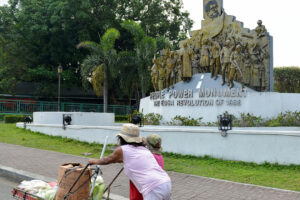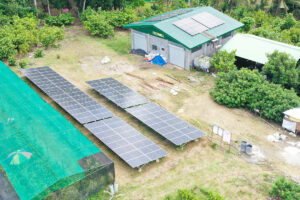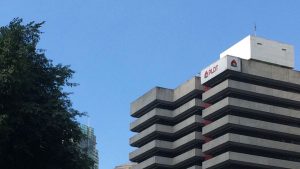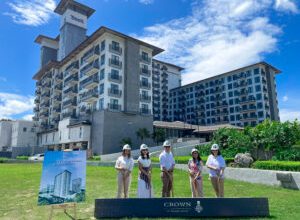Poverty, corruption persist 38 years after ‘People Power’ uprising

By Kyle Aristophere T. Atienza, Reporter
JANDHEL SANDOVAL wasn’t born yet when Filipinos marched along a major thoroughfare in the Philippine capital region 38 years ago to end the dictatorship of the late Ferdinand E. Marcos, whose two-decade rule was marked by human rights violations and corruption.
The 22-year-old college student said “People Power” has come to symbolize freedom and democracy, but he isn’t sure its so-called gains have meant much for ordinary people like him, especially now that corruption and poverty persist.
“Living on an island with scarce resources like water and electricity, the relevance of EDSA seems to have diminished over the years,” said Mr. Sandoval, who grew up in Oriental Mindoro, an island-province that has been ruled by dynasties and which is known for almost-daily blackouts. “EDSA’s ideals have remained largely unrealized — socioeconomic challenges persist or have worsened.”
Filipinos took to the streets in 1986 to protest the excesses of the regime of Ferdinand Marcos, who according to government estimates stole as much as $10 billion (P559 billion) from the Filipino people.
The street uprising sent the Marcos family into exile in the United States, three years after the assassination of opposition leader Benigno “Ninoy” S. Aquino, Jr., Mr. Marcos’ political nemesis, at Manila’s international airport.
Ninoy’s death revitalized opposition to the Marcos regime and catapulted his widow, Corazon, into the political limelight. She later served as President for six years until 1992.
Thirty-eight years later, the former president’s son and namesake nicknamed Bongbong — among the first to return to the Philippines from exile in 1991 — is now Philippine President. His sister Imee is a senator, while their mother Imelda had been a congresswoman who represented their hometown in Ilocos Norte for most of the time since she came back three decades ago.
Mr. Marcos Jr.’s son Sandro, 29, is now a congressman representing Ilocos Norte’s first district, a position that his grandmother held for 24 years.
“When you have a majority of people supporting President Bongbong Marcos, who is his father’s proud namesake, and a similar majority saying that the spirit of EDSA is alive, there needs to be conversations about what it means for those two things to be true at the same time,” Francis Joseph A. Dee, a grandson of Ninoy, said in an e-mail.
“There has to be a recognition that the post-EDSA regime left some people behind or didn’t do enough for them,” he said. “We shouldn’t see this as an attack on the spirit of EDSA but as a reminder that democracy is an imperfect system.”
“It’s incumbent on pro-democratic forces not just to defend democracy but to listen to and ultimately deliver for the people,” he added.
A WR Numero Research poll in December found that 45% of Filipinos held a positive view of the EDSA uprising, while 57% expressed a positive view of the late dictator’s martial rule. A February 2023 poll by the Social Weather Stations showed that 62% of Filipinos believed EDSA’s spirit is still alive.
This shows that many Filipinos don’t want to return to a dictatorial form of government, said Michael M. Pante, a history professor at the Ateneo de Manila University.
While the Marcoses managed to return to power, it does not mean Filipinos want a one-man rule or their freedom curtailed, he added. “The difficulty faced by Charter change initiatives attests to this.”
Mr. Marcos and his allies in Congress are pushing to amend the post-dictatorship 1987 Constitution, including lifting foreign ownership limits to attract more investments.
Jose Enrique A. Africa, executive director of think tank IBON Foundation, blames past governments’ neglect of the agriculture sector and failure to develop the country’s industrial base for low-paying jobs.
“The Charter’s wisdom of a developmental state is more relevant than ever today when even advanced economies are reverting to the kind of protection, self-reliance and independence so wisely enshrined in the 1987 Constitution,” he said in a Facebook Messenger chat.
‘POPULIST DEMAGOGUES’Discontent in Philippine democracy, which led to the presidential victory of firebrand leader Rodrigo R. Duterte in 2016, was largely fueled by economic issues, Temario C. Rivera, who heads the Center for People Empowerment in Governance, said in an e-mail.
“The post-EDSA decades dramatized the hollowness of restoring the formal trappings of democracy without addressing the deep material privations and inequalities among our people,” he said. He added that EDSA birthing was a “highly contested and contradictory” process.
The broad Left movement sought changes to address systemic inequality, while the traditional elite had largely been content with restoring the institutions of democracy “without the necessary economic and social reforms that ensure the success of electoral democracies,” Mr. Rivera said.
“The politicized faction of the military engaged in various mutinies to seize power, but its leaders eventually embraced the electoral arena as a less costly path to power,” he added.
Mr. Marcos and tandem mate Vice-President Sara Duterte-Carpio, daughter of his successor, won by a landslide in the 2022 presidential election.
“While the rise and continuing popularity of Duterte seem to negate the spirit of EDSA, most Filipinos who continue to support him still cling on to that promise of change that defined his campaign in 2016,” Mr. Pante said.
“EDSA was also like that — a promise of substantive change,” he said. “What went wrong, however, was the hollowness of that rhetoric of change when Duterte was in power, which was masked by disinformation and the facade of progress courtesy of palliatives like the ‘Build, Build, Build’ program and anti-drug campaign.”
Mr. Pante said people should expose this hollowness because many of these palliatives are being continued by the Marcos government.
Cracks in the ruling coalition have emerged in recent months, with Mr. Marcos and Mr. Duterte trading blows over drug use amid major policy differences.
Mr. Duterte, whose deadly war on drugs is being investigated by the International Criminal Court, has accused Mr. Marcos of pushing Charter change to stay in power. He has also criticized his successor’s decision to give the US expanded access to Philippine military bases.
Opposition forces have stepped up unity efforts which, for now, are directed at thwarting the push to amend the Constitution.
Opposition groups led by Bagong Alyansang Makabayan, Laban ng Masa, Akbayan Party and the Liberal Party commemorated the 38th anniversary of the 1986 People Power uprising with protests along the EDSA highway and in other parts of the country.
The country is several months away from the filing of candidacies for the 2025 midterm elections, and opinion polls seem to indicate another big loss for the opposition. The Vice-President was the top pick for President in 2028.
“The movement that will really give life to the promises of EDSA can’t just be built on the advocacy of good governance but one that can clearly articulate a positive identity for the Filipino people and offer a set of policies that will bring that identity to life,” said Mr. Dee, the grandson of the Aquinos.
“EDSA gave us an identity once — the bastion of democracy in Asia,” he said. “For EDSA to really be accepted as a basis for our national identity again, we need to figure out a way to make its democratic institutions deliver for people.”
The opposition should form a broad political coalition that doesn’t have to start as one solid national party but as a dispersed movement of like-minded people and groups, Mr. Dee said. It should carry a common platform of government with an “industrialist program” and selectively run for positions in local and national contests “where the likelihood of success is greater.”
“The cynicism of certain groups toward EDSA stems from a genuine dislike for the same structural flaws that haunted the country during martial law,” said Mr. Pante, the historian.
“It is just a matter of demonstrating to these groups that their desire for change should not translate to hating EDSA or being dependent on the work of populist demagogues, but on working together as a people to build movements that reflect the true democratic desires of ordinary Filipinos,” he said.




